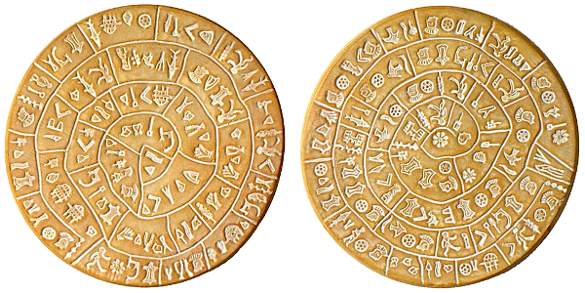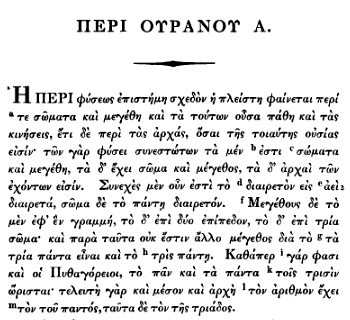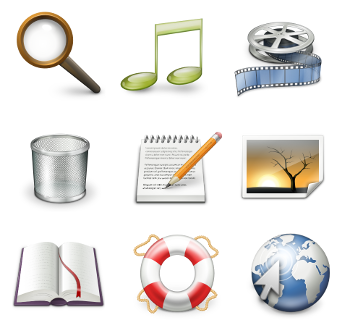Iconicity
October 8, 2015
Mankind's greatest
invention is
language.
Spoken language gives us the ability to exchange
ideas with each other, including the important activity of
teaching our
children, while
written language gives us the ability to convert
short-term memory to long-term
cultural memory. I wrote about some
scientific aspects of language in two earlier articles (
Proto-Tongues, February 18, 2013, and
Conserved Words, September 16, 2013)

Both sides of the Phaistos Disk, a fired clay disk about six inches in diameter that's completely covered on each side with stamped symbols arrayed in a spiralfrom center to edge. The disk is about 3,500 years old, and it was found in the Minoan palace of Phaistos. The language, which has similarities to Linear A and Linear B, is unknown. No other examples of the Phaistos script have been found, and it's unlikely that a translation can be made, since there's no point of reference. (Photo by Maksim, via Wikimedia Commons.})
Since various human
cultures developed in relative isolation from each other, it's not surprising that many languages are spoken. There are more than 4,000 major languages in the world today, with an additional two thousand spoken by just a few people. There are only 380 million people who speak
English as a first language, but there are half a billion others who speak English as a second language. Those who think that English has a good standing as a "
universal language" should consider that
nearly a billion people speak
Mandarin Chinese as their first language.
At one time,
Latin was the established language of
science. Isaac Newton wrote his scientific works, such as his
Philosophiae Naturalis Principia Mathematica, in Latin, as did
Copernicus (
De revolutionibus orbium coelestium) and
Galileo (
Sidereus Nuncius). As I wrote in a
previous article (Lingua Franca, November 10, 2014), English is now the preferred language of science, a result of the hegemony of American science after
World War II, among other factors.

The earliest science was written in Greek.
Aristotle's "On the Heavens," portion of the first page of an 1837 edition.
(Via Wikimedia Commons.)
The
Romance Languages serve as an example that there are significant similarities of
words between languages. As an example, the following table shows the equivalent word for the English, "
cat," in various Romance and non-Romance languages (as verified on
Google Translate).
One possible reason for such similarity between languages is the principle that
spoken language is limited by the possible sounds produced by the human vocal tract. The word "ma-ma," is easy to produce, so it's no wonder that this is usually the first word spoken by infants.
The more common words within a particular language are quite persistent. the English words, I, we, two and three, have persisted for tens of thousands of years.[1] Less common words are not as permanent. Most words have a 50% chance of being replaced by a completely different word in 2,000-4,000 years,[2] and they're likely to be extinct after 9,000 years.[3] One interesting linguistic fact is that the word, "
alcohol," has been essentially unchanged from its Sumerian form of six thousand years ago.[4]
This brings us to the principal mystery of linguistics; namely, why did our
ancestors choose to call a cat, "cat," in the
prototypal language from which our word derives, and not something else. As
Shakespeare wrote in
Romeo and Juliet, "
a rose by any other name would smell as sweet." Is there something about certain words that predisposes their being used one way, and not another?
Plato considered this question nearly two and a half
millennia ago in his
dialogue, "
Cratylus." It's obvious that
onomatopoeic words, such as "buzz" and "zip," are linked to their properties, but what about the others?
Psychologists at the
University of Miami (Coral Gables, Florida), and the
University of Wisconsin-Madison (Madison, Wisconsin) argue in a recent
PLoS ONE paper that assignment of words in not by
chance.[5-6] They write that there is considerable evidence that
iconicity, the resemblance between form and meaning, is a widespread property of language, and that iconicity is more common than previously believed in
Indo-European languages, of which English is a member.[5]

Computer icons are the type of icon with which most people are familiar.
Assorted Linux icons from the /usr/share/icons directory of my Linux desktop computer.
Left to right by row, search, music, video, trash, text editor, image, dictionary, help, and web browser)
The core of science is
experiment, so this
research team designed and conducted a series of experiments to test certain
hypotheses related to the principle of iconicity. Native speakers of English and Spanish were tested to determine the iconicity of about 600 words from a standard
corpus.[5] The experiments provided evidence that iconicity is an important property in both English and Spanish.[5]
Adjectives were found to be more iconic than
nouns and functional words in both English and Spanish.[6]
Vowel sounds contribute to iconicity; for example, the vowel in the word, "huge," sounds "big," while the vowels in the word, "tiny," sound "small."[6] Says
Lynn Perry,
assistant professor of
psychology at the University of Miami College and co-lead
author of the study,
"If you show people a novel pointy object and a novel round object, and ask them which of these is a 'kiki' and which is a 'bouba,' they are more likely to say that a pointy object is called 'kiki' and the round one is called 'bouba,' because they sound more pointy and round, respectively."[6]
Most interestingly, it was found that words learned at an earlier age, the most basic words in any language, tend to be more iconic.[5]
Marcus Perlman, co-lead author of the study and a
postdoctoral research associate at the University of Wisconsin-Madison, makes the following observation:
"Young children face the very considerable challenge of figuring out that all these vocalizations that the people around them are making mean something, and further, that they mean very particular things... When words are iconic, the sound of the word instinctively primes its meaning, and this helps children to understand that the sound is a word with a particular meaning, and that words in general have meanings."[6]

Another example of iconicity in a language.
English Braille code for the letter, "l."
(Image created with Inkscape.)
![]()
References:
- 'Oldest English words' identified, BBC News, February 26, 2009.
- David Brown, "Linguists identify words that have changed little in 15,000 years," The Age, May 7, 2013.
- Mark Pagel, Quentin D. Atkinson, Andreea S. Calude and Andrew Meade, "Ultraconserved words point to deep language ancestry across Eurasia," Proc. Natl. Acad. Sci., vol. 110, no. 21 (May 21, 2013), pp. 8471-8476.. A copy of the open access PDF file is available, here.
- Matt Peckham, "Move Over, BabelFish: Computer Program Reconstructs Lost Tongues," Techland, Time Magazine, February 12, 2013.
- Lynn K. Perry, Marcus Perlman, and Gary Lupyan, "Iconicity in English and Spanish and Its Relation to Lexical Category and Age of Acquisition," PLoS ONE, vol. 10, no. 9 (September 4, 2015), Document no. e0137147, doi:10.1371/journal.pone.0137147. This is an open access article with a PDF file available here.
- Finding Iconicity in Spoken Languages, University of Miami Press Release, September 8, 2015.
Permanent Link to this article
Linked Keywords: Human; Mankind; invention; language; spoken language; idea; education; teaching; child; children; written language; short-term memory; cultural memory; science; scientific; Phaistos Disk; furnace; fired; clay; inch; diameter; stamped; symbol; spiral; Minoan civilization; Phaistos; Linear A; Linear B; translation; Wikimedia Commons; culture; English language; universal language; languages by total number of speakers; Mandarin Chinese; Latin; Isaac Newton; Philosophiae Naturalis Principia Mathematica; Nicolaus Copernicus; De revolutionibus orbium coelestium; Galileo Galilei; Sidereus Nuncius; World War II; Greek language; Aristotle; On the Heavens; De Caelo; Romance Languages; word; cat; Google Translate; French language; German language; Italian language; Norwegian language; Swedish language; Polish language; Catalan language; Spanish language; Portuguese language; Basque language; sound; vocal tract; infant; extinct language; linguistics; alcohol; Sumerian language; mystery; ancestor; prototypal; William Shakespeare; Romeo and Juliet; a rose by any other name would smell as sweet; Plato; millennium; millennia; dialogue; Cratylus; onomatopoeia; onomatopoeic; psychologist; University of Miami (Coral Gables, Florida); University of Wisconsin-Madison (Madison, Wisconsin); PLoS ONE; academic publishing; paper; chance; iconicity; Indo-European languages; computer icon; Linux; desktop computer; search; music; video; trash (computing); text editor; image; dictionary; help; web browser; experiment; research; hypothesis; hypotheses; text corpus; adjective; noun; vowel; Lynn Perry; assistant professor; psychology; author; Marcus Perlman; postdoctoral research associate; child; children; vocalization; English Braille; Inkscape.